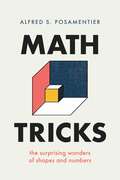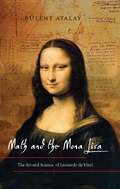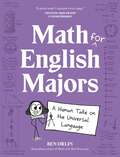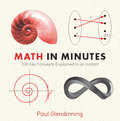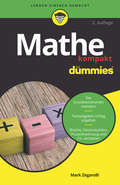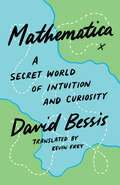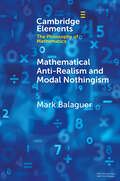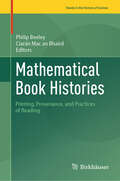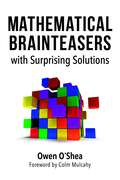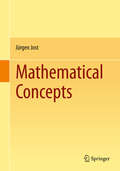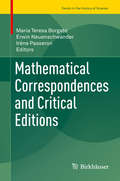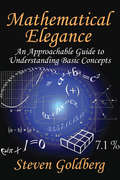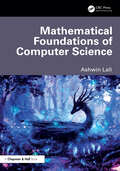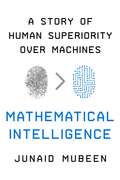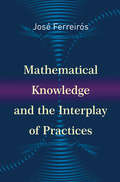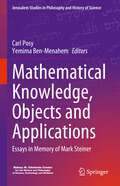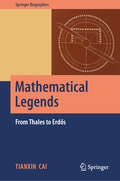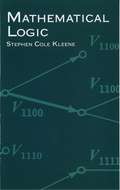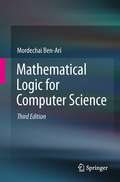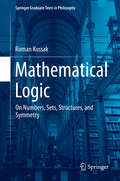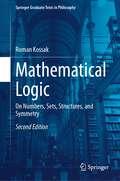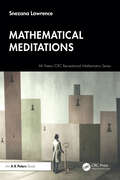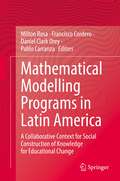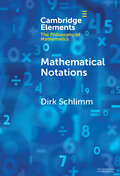- Table View
- List View
Math Tricks: The Surprising Wonders of Shapes and Numbers
by Alfred S. PosamentierIt is no secret that most people avoid mathematics, in large measure because elementary school teachers have never done much to motivate a love of the subject matter. In his latest book, mathematician Alfred S. Posamentier provides easily understandable, easily presentable and easily replicated tricks that one can do with mathematics. All that is required is the ability to do arithmetic, understand the very basics of algebra and geometry and have an open mind for probability. From geometrical puzzles to numerical quirks, Math Tricks will give readers that "aha!" moment they may never have received at school.
Math and the Mona Lisa: The Art and Science of Leonardo da Vinci
by Bulent AtalayLeonardo da Vinci was one of history's true geniuses, equally brilliant as an artist, scientist, and mathematician. Readers of The Da Vinci Code were given a glimpse of the mysterious connections between math, science, and Leonardo's art. Math and the Mona Lisa picks up where The Da Vinci Code left off, illuminating Leonardo's life and work to uncover connections that, until now, have been known only to scholars. Bülent Atalay, a distinguished scientist and artist, examines the science and mathematics that underlie Leonardo's work, paying special attention to the proportions, patterns, shapes, and symmetries that scientists and mathematicians have also identified in nature. Following Leonardo's own unique model, Atalay searches for the internal dynamics of art and science, revealing to us the deep unity of the two cultures. He provides a broad overview of the development of science from the dawn of civilization to today's quantum mechanics. From this base of information, Atalay offers a fascinating view into Leonardo's restless intellect and modus operandi, allowing us to see the source of his ideas and to appreciate his art from a new perspective.From the Hardcover edition.
Math for English Majors: A Human Take on the Universal Language
by Ben OrlinIn this trailblazing work from the internet&’s most empathetic math teacher, Ben Orlin unravels the secrets behind the world&’s most confounding language. Math, it is said, is the "universal language.&” But if a language brings people together, why does math make so many of us feel so alone? In Math for English Majors, bestselling author Ben Orlin (Math with Bad Drawings) offers fresh insights for the mathematically perplexed and mathematical masters alike. As Orlin reveals, the &“universal language&” is precisely that: a language. It has nouns (numbers), verbs (calculations), and grammar (algebra). It has funny idioms (&“exponential&”), quirky etymologies (&“squaring&”), and peculiar ambiguities (&“PEMDAS&”). It even has its own form of literature, with equations ranging from the simple wisdom of A2 + B2 = C2 to the startling profundity of eπi + 1 = 0. Along the way, he shares relatable stories of his own mathematical misunderstandings and epiphanies, as well as the trials and triumphs of his students. And, as always, he sheds further light and levity on the subject with his inept—yet strangely effective—drawings.
Math in FocusTM: The Singapore Approach, Student Book, 3B
by Fong Ho Kheong Chelvi Ramakrishnan Michelle ChooNIMAC-sourced textbook
Math in Minutes
by Paul GlendinningBoth simple and accessible, Math in Minutes is a visually led introduction to 200 key mathematical ideas. Each concept is quick and easy to remember, described by means of an easy-to-understand picture and a maximum 200-word explanation.Concepts span all of the key areas of mathematics, including Fundamentals of Mathematics, Sets and Numbers, Geometry, Equations, Limits, Functions and Calculus, Vectors and Algebra, Complex Numbers, Combinatorics, Number Theory, Metrics and Measures and Topology.From the Trade Paperback edition.
Mathe kompakt für Dummies (Für Dummies)
by Mark ZegarelliMathematik ist nicht jedermanns Sache und oft hapert es schon an den Grundlagen. Frei nach dem Motto "Einst gelernt, doch längst vergessen" bereiten oft gerade die einfachen Fragestellungen Probleme. Wie viel Prozent sind das nochmal? Wie war das doch gleich mit der Bruchrechnung und wie berechnet man eigentlich den Flächeninhalt eines Dreiecks? Mark Zegarelli erklärt es Ihnen, einfach und zugleich amüsant. Dabei kommt er immer schnell auf den Punkt und hilft Ihnen so, Ihre Wissenslücken zu schließen.
Mathematica: A Secret World of Intuition and Curiosity
by David BessisA fascinating look into how the transformative joys of mathematical experience are available to everyone, not just specialists Math has a reputation for being inaccessible. People think that it requires a special gift or that comprehension is a matter of genes. Yet the greatest mathematicians throughout history, from René Descartes to Alexander Grothendieck, have insisted that this is not the case. Like Albert Einstein, who famously claimed to have &“no special talent,&” they said that they had accomplished what they did using ordinary human doubts, weaknesses, curiosity, and imagination. David Bessis guides us on an illuminating path toward deeper mathematical comprehension, reconnecting us with the mental plasticity we experienced as children. With simple, concrete examples, Bessis shows how mathematical comprehension is integral to the great learning milestones of life, such as learning to see, to speak, to walk, and to eat with a spoon. Focusing on the deeply human roots of mathematics, Bessis dispels the myths of mathematical genius. He offers an engaging initiation into the experience of math not as a series of discouragingly incomprehensible logic problems but as a physical activity akin to yoga, meditation, or a martial art. This perspective will change the way you think not only about math but also about intelligence, intuition, and everything that goes on inside your head.
Mathematical Anti-Realism and Modal Nothingism (Elements in the Philosophy of Mathematics)
by Mark BalaguerThis Element defends mathematical anti-realism against an underappreciated problem with that view-a problem having to do with modal truthmaking. Part I develops mathematical anti-realism, it defends that view against a number of well-known objections, and it raises a less widely discussed objection to anti-realism-an objection based on the fact that (a) mathematical anti-realists need to commit to the truth of certain kinds of modal claims, and (b) it's not clear that the truth of these modal claims is compatible with mathematical anti-realism. Part II considers various strategies that anti-realists might pursue in trying to solve this modal-truth problem with their view, it argues that there's only one viable view that anti-realists can endorse in order to solve the modal-truth problem, and it argues that the view in question-which is here called modal nothingism-is true.
Mathematical Book Histories: Printing, Provenance, and Practices of Reading (Trends in the History of Science)
by Ciarán Mac an Bhaird Philip BeeleyThis book both articulates and responds to increasing scholarly interest in the materiality of the book. Taking as its base the unique collection of mathematical books in the Russell Library at Maynooth, it addresses questions related to printing techniques and print culture, book production, provenance, and reading practices. It considers the histories of individual items of the Russell Collection, their previous locations and owners, and explores ways in which annotations, underlinings, hand-drawn diagrams, and the like reveal patterns of reading and usage. Finally, it seeks to elicit more information on a previously under-researched topic: the historical role of mathematics in the extensive network of Irish colleges that once covered Catholic Europe, located in places such as Salamanca, Rome, Douai, and Prague. Alongside delivering important new insights into print culture as a medium for transmitting scientific ideas, Mathematical Book Histories is thus also intended to contribute to a broader understanding of the role and significance of mathematics in the context of clerical instruction and more broadly in the academic tradition of Ireland up to the beginning of the twentieth century. Many of the volumes in the Russell Library reflect the remarkably rich book-trade that flourished in seventeenth and early eighteenth century Dublin and which was quite distinct from that in London. Booksellers often bought in their wares directly from abroad, with the result that publications could enter collections that did not enter the purview of contemporary English or Scottish scholars in Britain.
Mathematical Brainteasers with Surprising Solutions
by Owen O'SheaProves that math can be serious fun! If you like any kind of game at all, you'll enjoy the amazing mathematical brainteasers in this entertaining book. No special mathematics training is needed. With an emphasis on puzzling word problems with surprising solutions, the author presents his mathematical hurdles in order of increasing difficulty. Many appear deceptively simple, such as: How many quarter-inch marks are on an unusual sixteen-inch ruler? Or: If the cost of a bottle and a cork is $1.10 and the bottle costs $1.00 more than the cork, how much did the bottle alone cost? Check the answers before you decide that these are too easy. You may be surprised. Novices may want to begin with some of the teasers in the first "easy" section. More experienced math-heads may want to test their wits with the "challenging" or even the "difficult" sections (some are fiendishly difficult). Including word problems by famed mathematical puzzle geniuses Sam Loyd (1841 - 1911) and Henry Ernest Dudeney (1857 - 1930), which have entertained recreational math aficionados for more than a century, this book has something for puzzle solvers at any level. And for the math phobic, it may whet your appetite to delve into a subject you thought could only be boring.
Mathematical Concepts
by Jürgen JostThe main intention of this book is to describe and develop the conceptual, structural and abstract thinking of mathematics. Specific mathematical structures are used to illustrate the conceptual approach; providing a deeper insight into mutual relationships and abstract common features. These ideas are carefully motivated, explained and illustrated by examples so that many of the more technical proofs can be omitted. The book can therefore be used: · simply as an overview of the panorama of mathematical structures and the relations between them, to be supplemented by more detailed texts whenever you want to acquire a working knowledge of some structure · by itself as a first introduction to abstract mathematics · together with existing textbooks, to put their results into a more general perspective · to gain a new and hopefully deeper perspective after having studied such textbooks Mathematical Concepts has a broader scope and is less detailed than standard mathematical textbooks so that the reader can readily grasp the essential concepts and ideas for individual needs. It will be suitable for advanced mathematicians, postgraduate students and for scientists from other fields with some background in formal reasoning.
Mathematical Correspondences and Critical Editions (Trends in the History of Science)
by Maria Teresa Borgato Erwin Neuenschwander Irène PasseronMathematical correspondence offers a rich heritage for the history of mathematics and science, as well as cultural history and other areas. It naturally covers a vast range of topics, and not only of a scientific nature; it includes letters between mathematicians, but also between mathematicians and politicians, publishers, and men or women of culture. Wallis, Leibniz, the Bernoullis, D'Alembert, Condorcet, Lagrange, Gauss, Hermite, Betti, Cremona, Poincaré and van der Waerden are undoubtedly authors of great interest and their letters are valuable documents, but the correspondence of less well-known authors, too, can often make an equally important contribution to our understanding of developments in the history of science. Mathematical correspondences also play an important role in the editions of collected works, contributing to the reconstruction of scientific biographies, as well as the genesis of scientific ideas, and in the correct dating and interpretation of scientific writings. This volume is based on the symposium “Mathematical Correspondences and Critical Editions,” held at the 6th International Conference of the ESHS in Lisbon, Portugal in 2014. In the context of the more than fifteen major and minor editions of mathematical correspondences and collected works presented in detail, the volume discusses issues such as • History and prospects of past and ongoing edition projects, • Critical aspects of past editions, • The complementary role of printed and digital editions, • Integral and partial editions of correspondence, • Reproduction techniques for manuscripts, images and formulae, and the editorial challenges and opportunities presented by digital technology.
Mathematical Elegance: An Approachable Guide to Understanding Basic Concepts
by Steven GoldbergThe heart of mathematics is its elegance; the way it all fits together. Unfortunately, its beauty often eludes the vast majority of people who are intimidated by fear of the difficulty of numbers. Mathematical Elegance remedies this. Using hundreds of examples, the author presents a view of the mathematical landscape that is both accessible and fascinating. At a time of concern that American youth are bored by math, there is renewed interest in improving math skills. Mathematical Elegance stimulates students, along with those already experienced in the discipline, to explore some of the unexpected pleasures of quantitative thinking. Invoking mathematical proofs famous for their simplicity and brainteasers that are fun and illuminating, the author leaves readers feeling exuberant-as well as convinced that their IQs have been raised by ten points. A host of anecdotes about well-known mathematicians humanize and provide new insights into their lofty subjects. Recalling such classic works as Lewis Carroll's Introduction to Logic and A Mathematician Reads the Newspaper by John Allen Paulos, Mathematical Elegance will energize and delight a wide audience, ranging from intellectually curious students to the enthusiastic general reader.
Mathematical Foundations of Computer Science
by Ashwin LallMathematical Foundations of Computer Science introduces students to the discrete mathematics needed later in their Computer Science coursework with theory of computation topics interleaved throughout. Students learn about mathematical concepts just in time to apply them to theory of computation ideas. For instance, sets motivate the study of finite automata, direct proof is practised using closure properties, induction is used to prove the language of an automaton, and contradiction is used to apply the pumping lemma. The main content of the book starts with primitive data types such as sets and strings and ends with showing the undecidability of the halting problem. There are also appendix chapters on combinatorics, probability, elementary number theory, asymptotic notation, graphs, loop invariants, and recurrences. The content is laid out concisely with a heavy reliance on worked examples, of which there are over 250 in the book. Each chapter has exercises, totalling 550. This class-tested textbook is targeted to intermediate Computer Science majors, and it is primarily intended for a discrete math / proofs course in a Computer Science major. It is also suitable for introductory theory of computation courses.The authors hope this book breeds curiosity into the subject and is designed to satisfy this to some extent by reading this book. The book will prepare readers for deeper study of game theory applications in many fields of study.
Mathematical Intelligence: A Story of Human Superiority Over Machines
by Mubeen JunaidA fresh exploration into the 'human nature versus technology&’ argument, revealing an unexpected advantage that humans have over our future robot masters: we&’re actually good at mathematics. There&’s so much discussion about the threat posed by intelligent machines that it sometimes seems as though we should simply surrender to our robot overlords now. But Junaid Mubeen isn&’t ready to throw in the towel just yet. As far as he is concerned, we have the creative edge over computers, because of a remarkable system of thought that humans have developed over the millennia. It&’s familiar to us all, but often badly taught in schools and misrepresented in popular discourse—math. Computers are, of course, brilliant at totting up sums, pattern-seeking, and performing mindless tasks of, well, computation. For all things calculation, machines reign supreme. But Junaid identifies seven areas of intelligence where humans can retain a crucial edge. And in exploring these areas, he opens up a fascinating world where we can develop our uniquely human mathematical talents. Just a few of the fascinating subjects covered in MATHEMATICAL INTELLIGENCE include: -Humans are endowed with a natural sense of numbers that is based on approximation rather than precise calculation. Our in-built estimation skills complement the precision of computers. Interpreting the real world depends on both. -What sets humans apart from other animals is language and abstraction. We have an extraordinary ability to create powerful representations of knowledge— more diverse than the binary language of computers. -Mathematics confers the most robust, logical framework for establishing permanent truths. Reasoning shields us from the dubious claims of pure pattern-recognition systems. -All mathematical truths are derived from a starting set of assumptions, or axioms. Unlike computers, humans have the freedom to break free of convention and examine the logical consequences of our choices. Mathematics rewards our imagination with fascinating and, on occasion, applicable concepts that originate from breaking the rules. -Computers can be tasked to solve a range of problems, but which problems are worth the effort? Questioning is as vital to our repertoire of thinking skills as problem-solving itself.
Mathematical Knowledge and the Interplay of Practices
by José FerreirósThis book presents a new approach to the epistemology of mathematics by viewing mathematics as a human activity whose knowledge is intimately linked with practice. Charting an exciting new direction in the philosophy of mathematics, José Ferreirós uses the crucial idea of a continuum to provide an account of the development of mathematical knowledge that reflects the actual experience of doing math and makes sense of the perceived objectivity of mathematical results.Describing a historically oriented, agent-based philosophy of mathematics, Ferreirós shows how the mathematical tradition evolved from Euclidean geometry to the real numbers and set-theoretic structures. He argues for the need to take into account a whole web of mathematical and other practices that are learned and linked by agents, and whose interplay acts as a constraint. Ferreirós demonstrates how advanced mathematics, far from being a priori, is based on hypotheses, in contrast to elementary math, which has strong cognitive and practical roots and therefore enjoys certainty.Offering a wealth of philosophical and historical insights, Mathematical Knowledge and the Interplay of Practices challenges us to rethink some of our most basic assumptions about mathematics, its objectivity, and its relationship to culture and science.
Mathematical Knowledge, Objects and Applications: Essays in Memory of Mark Steiner (Jerusalem Studies in Philosophy and History of Science)
by Yemima Ben-Menahem Carl J. PosyThis book provides a survey of a number of the major issues in the philosophy of mathematics, such as ontological questions regarding the nature of mathematical objects, epistemic questions about the acquisition of mathematical knowledge, and the intriguing riddle of the applicability of mathematics to the physical world. Some of these issues go back to the nascent years of mathematics itself, others are just beginning to draw the attention of scholars. In addressing these questions, some of the papers in this volume wrestle with them directly, while others use the writings of philosophers such as Hume and Wittgenstein to approach their problems by way of interpretation and critique. The contributors include prominent philosophers of science and mathematics as well as promising younger scholars. The volume seeks to share the concerns of philosophers of mathematics with a wider audience and will be of interest to historians, mathematicians and philosophers alike.
Mathematical Legends: From Thales to Erdős (Springer Biographies)
by Tianxin CaiThis book is not only about the history of mathematics, but also by telling the story of some of the most distinctive personalities in the history of mathematics, it goes on to reveal the various strange treasures, bright flowers and hidden passions of the mathematical kingdom. Some of these mathematicians were thinkers, writers, poets, musicians, painters, politicians, judges, soldiers, clerks, young men of society or even prisoners. The mathematical world constructed by these geniuses is exquisite, and a walk in such a world not only expands our mathematical horizons and imagination, but also raises our humanistic cultivation to a higher level. Written for general audience, this book will be of interest to anyone who's studied mathematics in university or even high school, while also benefiting researchers in mathematics and the humanities. The readers will also enjoy reading the beautiful and simple language of all the articles and interviews.
Mathematical Logic
by Stephen Cole KleeneUndergraduate students with no prior classroom instruction in mathematical logic will benefit from this evenhanded multipart text. It begins with an elementary but thorough overview of mathematical logic of first order. The treatment extends beyond a single method of formulating logic to offer instruction in a variety of techniques: model theory (truth tables), Hilbert-type proof theory, and proof theory handled through derived rules.The second part supplements the previously discussed material and introduces some of the newer ideas and the more profound results of twentieth-century logical research. Subsequent chapters explore the study of formal number theory, with surveys of the famous incompleteness and undecidability results of Godel, Church, Turing, and others. The emphasis in the final chapter reverts to logic, with examinations of Godel's completeness theorem, Gentzen's theorem, Skolem's paradox and nonstandard models of arithmetic, and other theorems. The author, Stephen Cole Kleene, was Cyrus C. MacDuffee Professor of Mathematics at the University of Wisconsin, Madison. Preface. Bibliography. Theorem and Lemma Numbers: Pages. List of Postulates. Symbols and Notations. Index.
Mathematical Logic for Computer Science
by Mordechai Ben-AriMathematical Logic for Computer Science is a mathematics textbook with theorems and proofs, but the choice of topics has been guided by the needs of students of computer science. The method of semantic tableaux provides an elegant way to teach logic that is both theoretically sound and easy to understand. The uniform use of tableaux-based techniques facilitates learning advanced logical systems based on what the student has learned from elementary systems. The logical systems presented are: propositional logic, first-order logic, resolution and its application to logic programming, Hoare logic for the verification of sequential programs, and linear temporal logic for the verification of concurrent programs. The third edition has been entirely rewritten and includes new chapters on central topics of modern computer science: SAT solvers and model checking.
Mathematical Logic: Essays On Set Theory, Model Theory, Philosophical Logic And Philosophy Of Mathematics (Ontos Mathematical Logic Ser. #5)
by Roman KossakThis book, presented in two parts, offers a slow introduction to mathematical logic, and several basic concepts of model theory, such as first-order definability, types, symmetries, and elementary extensions. Its first part, Logic Sets, and Numbers, shows how mathematical logic is used to develop the number structures of classical mathematics. The exposition does not assume any prerequisites; it is rigorous, but as informal as possible. All necessary concepts are introduced exactly as they would be in a course in mathematical logic; but are accompanied by more extensive introductory remarks and examples to motivate formal developments. The second part, Relations, Structures, Geometry, introduces several basic concepts of model theory, such as first-order definability, types, symmetries, and elementary extensions, and shows how they are used to study and classify mathematical structures. Although more advanced, this second part is accessible to the reader who is either already familiar with basic mathematical logic, or has carefully read the first part of the book. Classical developments in model theory, including the Compactness Theorem and its uses, are discussed. Other topics include tameness, minimality, and order minimality of structures. The book can be used as an introduction to model theory, but unlike standard texts, it does not require familiarity with abstract algebra. This book will also be of interest to mathematicians who know the technical aspects of the subject, but are not familiar with its history and philosophical background.
Mathematical Logic: On Numbers, Sets, Structures, and Symmetry (Springer Graduate Texts in Philosophy #4)
by Roman KossakThis textbook is a second edition of the successful, Mathematical Logic: On Numbers, Sets, Structures, and Symmetry. It retains the original two parts found in the first edition, while presenting new material in the form of an added third part to the textbook. The textbook offers a slow introduction to mathematical logic, and several basic concepts of model theory, such as first-order definability, types, symmetries, and elementary extensions. Part I, Logic Sets, and Numbers, shows how mathematical logic is used to develop the number structures of classical mathematics. All necessary concepts are introduced exactly as they would be in a course in mathematical logic; but are accompanied by more extensive introductory remarks and examples to motivate formal developments. The second part, Relations, Structures, Geometry, introduces several basic concepts of model theory, such as first-order definability, types, symmetries, and elementary extensions, and shows how they are usedto study and classify mathematical structures. The added Part III to the book is closer to what one finds in standard introductory mathematical textbooks. Definitions, theorems, and proofs that are introduced are still preceded by remarks that motivate the material, but the exposition is more formal, and includes more advanced topics. The focus is on the notion of countable categoricity, which analyzed in detail using examples from the first two parts of the book. This textbook is suitable for graduate students in mathematical logic and set theory and will also be of interest to mathematicians who know the technical aspects of the subject, but are not familiar with its history and philosophical background.
Mathematical Meditations (AK Peters/CRC Recreational Mathematics Series)
by Snezana LawrenceMathematical Meditations identifies, explores, and celebrates those aspects of mathematics that are good for you and your overall wellbeing. It is necessary for everyone to have a little time to think every so often: to contemplate, meditate, and try to understand where you are and what is going on around you. Mathematics can help you with all of that.The Meditations in this book are the product of thousands of years of mathematical discourse. As you read through the book and work through the various exercises, you will discover new mechanisms that allow you to contemplate and understand some complex mathematical principles. However, the focus will always be wider than a mere dry comprehension of theory, as you will be encouraged to meditate upon the deeper intrinsic beauty of mathematics and what it can reveal to us about the world around us.Features An original, engaging narrative format replete with novel exercises and examples Could be used in a classroom setting for liberal arts students, mathematics undergraduates, or high school teachers Accessible to anyone who wants to explore a different kind of perspective on mathematics
Mathematical Modelling Programs in Latin America: A Collaborative Context for Social Construction of Knowledge for Educational Change
by Milton Rosa Daniel Clark Orey Francisco Cordero Pablo CarranzaThis book is about the unique, sophisticated, and rigorous study of mathematics in Latin America developed over centuries of cultural exchange between Europe, North, and South America. More specifically, the book explores the tradition of mathematical modelling, introduced a century ago. This modelling was adapted to assist members of distinct communities to draw information about their own realities through the elaboration of representations, which generate mathematical knowledge that deals with creativity and invention. The book provides empirical evidence that a category of mathematical modelling developed in Latin America assesses the horizontal and reciprocal relations between mathematics (school/non-school contexts) and the real world. These relations provide an epistemological and ontological change, where mathematical knowledge of the others is recognized on a horizontal plane. Further, they oblige mathematics teachers and students to understand as a community of knowledge that builds their own mathematical categories of their environment governed by the reciprocal relationships between academic knowledge and functional knowledge. The dimensions of the relationships make up a frame of reference that guides educational change in mathematics. The book presents an inquiry-based approach of three Latin American modelling programs: ethnomodelling, transversality of knowledge, and reasoned decision-making. Each one, with its respective theoretical and methodological foundations related to ethnomathematics and mathematical modelling, socioepistemology, and the attribution of meaning to learning. Undoubtedly, the three mathematical modelling programs, independently, provide educational gains, each with its levels of specificity and loyal to its philosophical, theoretical, and methodological principles. However, the book places them together, organized by axes, to define a corpus of mathematical knowledge that envisions profound educational change through the development of different approaches of mathematical modelling. The authors of the 18 chapters in this book, who represent the diversity of Latin America, are from eight countries: Argentina, Brazil, Chile, Colombia, Costa Rica, Cuba, Ecuador, Honduras, and Mexico. They were invited to share their ideas, perspectives, and discuss investigations that represent a rich sample of three Latin American perspectives on mathematical modelling.
Mathematical Notations (Elements in the Philosophy of Mathematics)
by Dirk SchlimmThis Element lays the foundation, introduces a framework, and sketches the program for a systematic study of mathematical notations. It is written for everyone who is curious about the world of symbols that surrounds us, in particular researchers and students in philosophy, history, cognitive science, and mathematics education. The main characteristics of mathematical notations are introduced and discussed in relation to the intended subject matter, the language in which the notations are verbalized, the cognitive resources needed for learning and understanding them, the tasks that they are used for, their material basis, and the historical context in which they are situated. Specific criteria for the design and assessment of notations are discussed, as well as ontological, epistemological, and methodological questions that arise from the study of mathematical notations and of their use in mathematical practice.
